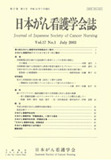Japanese
English
- 販売していません
- Abstract 文献概要
- 参考文献 Reference
- サイト内被引用 Cited by
要 旨
長期療養生活を続ける造血器がん患者にとっての希望の意味とその構造を帰納的に明らかにするために,大学病院に入院中の造血器がん患者7名に,3ヵ月間で延べ41回の面接調査を行った.エスノグラフィーの手法を用いて明らかにした6つのカテゴリー名は,生きたい,ただ良くなりたい,生きなくちや,嫌になる,治療を終えないとどうにもならない,病気と付き合っていくであった.
『生きる』というのが長期療養生活を続ける造血器がん患者が持つ希望のテーマであり,“生きたい”という思いをあらわすカテゴリーのなかに生きるという希望は表現されていた.彼らが生きるという状況をどのように捉えていたかは“ただ良くなりたい”理由をあらわすカテゴリーのなかに見ることができた.生きる意思を患者に与える機能を持った事柄は“生きなくちや,生きてやる”というカテゴリーを形成した.このカテゴリーにあらわされた内容は,“嫌”にさせる機能をあらわすカテゴリーの内容と対をなしていた.嫌になる対象は“治療を終えないことにはどうにもならない”という現実であり,がん患者がこのような現実に対処する方法は,“病気と付き合う”というカテゴリーにあらわされていた.
本研究結果には,長期療養を続ける造血器がん患者が困難な状況に身を置きながらも,彼ら特有の状況認識の方法や生きる姿勢によって希望を持ち続ける際の彼らのありようが示されていた.
Abstract
The meaning and structure of hope were inductively examined in patients with hematological cancer who were under long-term care. Using an ethnographic approach, 7 patients were interviewed 41 times over a period of 3 months. The results were expressed in the following 6 categories : (1) the will to live ; (2) simply wishing to get better ; (3) motivation for living ; (4) inconvenience and irritation ; (5) no hope for the future until treatment is completed ; and (6) coming to terms with the disease. The hope of patients with hematological cancer who are under long-term care was expressed by the theme of "living".
Their hope for "living" was expressed in the category that described the will to live. The category that consisted of reasons why they simply wish to get better explained how they perceive living under these circumstances. The category consisting of things that motivate one to live involved 5 aspects : 1) interpersonal relationship, 2) the fruits of their past experiences, 3) long-term care environment, 4) fear of death and dying, and 5) uncertainty. The category that consisted of inconvenience and irritation also confirmed the aspects corresponding to these findings. Cancer patients' inconvenience and irritation were caused by a situation in which they could not make their way to the future until their treatment was completed. They coped with that situation by coming to terms with their disease.
This study described the structure in which hematological cancer patients perceived their experiences while undergoing long-term care in their own way, maintained a positive attitude toward living in spite of inconvenient and irritating situations and continued to hope for the future.
Copyright © 2003, Japanese Society of Cancer Nursing All rights reserved.


